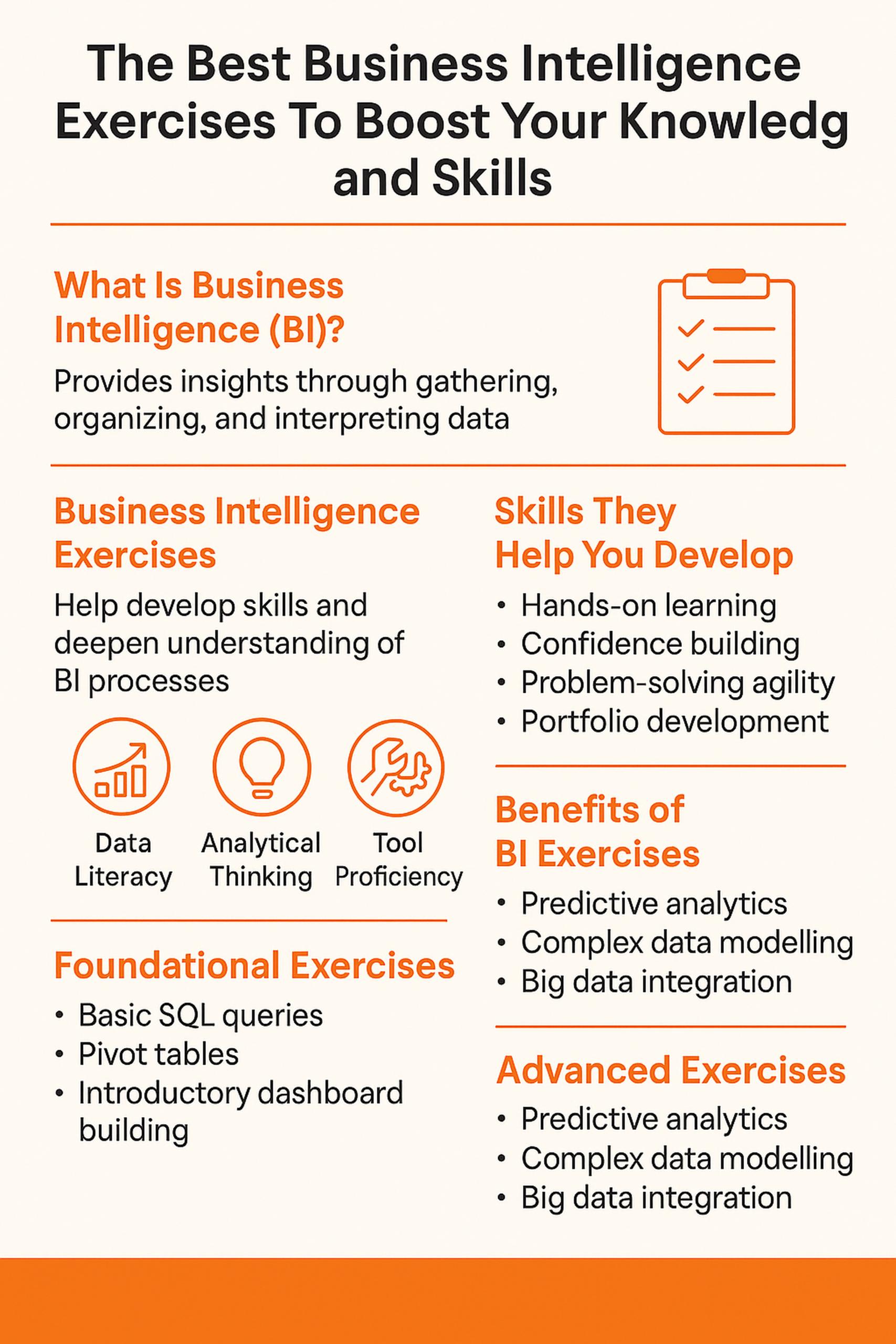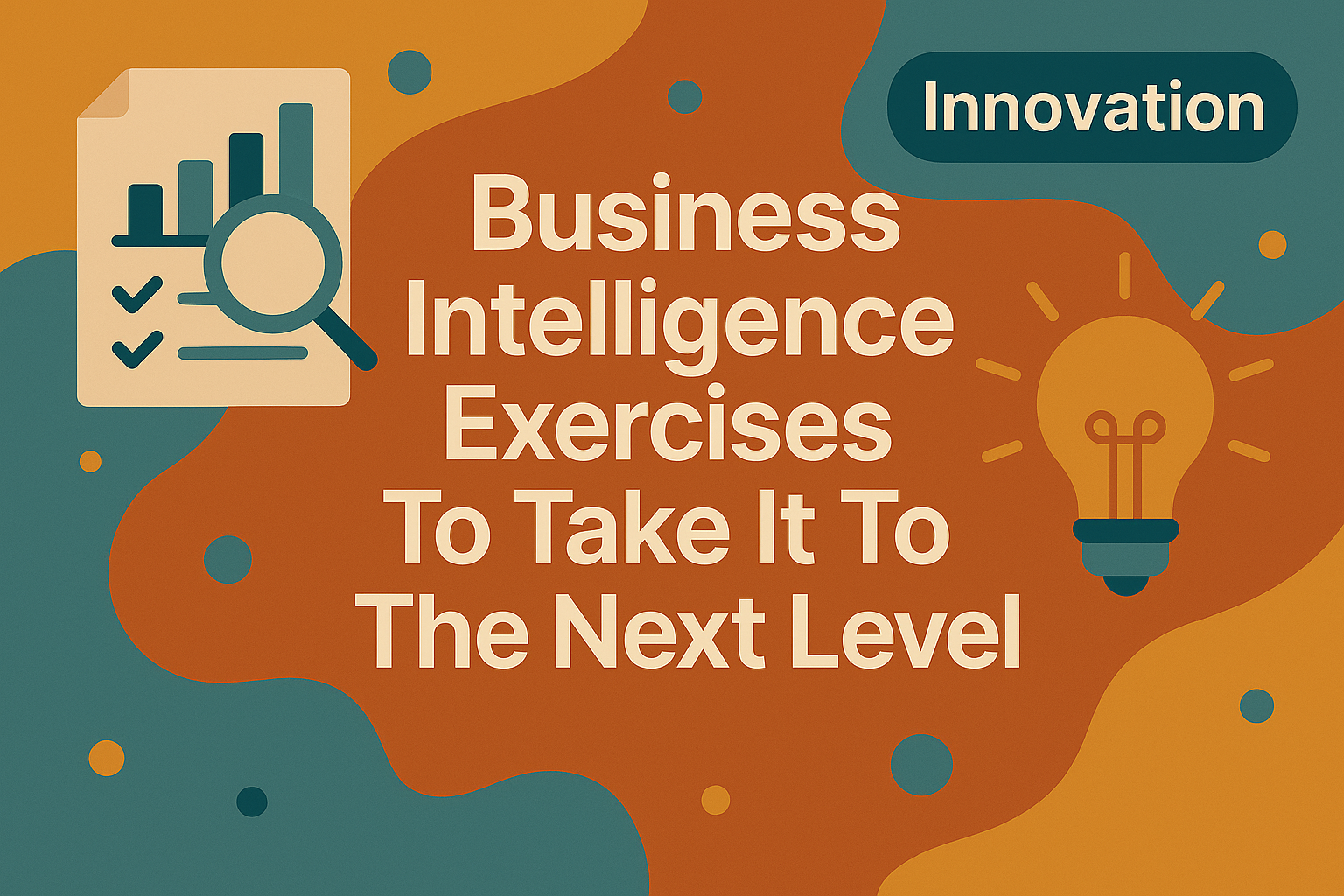The Best Business Intelligence Exercises To Boost Your Knowledge and Skills
If you work in business intelligence, you may be looking to hone your skills and develop a deeper understanding of how processes work. If so, you may have been directed toward business intelligence exercises and courses.
These activities are designed to teach you new skills and hone and develop those you already possess. But with so many different ones out there, it can feel overwhelming to know what to opt for and which will give you the best reward.
That’s why we put together this guide, to break down the best business intelligence exercises for beginners, right up to expert and advanced levels.
Let’s begin with the basics.
What Is Business Intelligence (BI) And What Role Does It Play?
Before we dive into exercises, it’s helpful to understand what business intelligence (BI) is and what role it plays. In short, it provides a system to gather, organize and interpret raw data. This may be done with the help of technologies, coding and other analytical methods, which we’ll look at below.
The purpose behind BI is to pull information from lots of different areas of a business to provide a more holistic view. This process can help you make better informed decisions, spot opportunities and any weaknesses that need to be addressed. It can also help a company to realign itself if it’s in a stagnant position financially.
So BI provides insights that you can take action upon to hopefully gain improvements or growth. As you can imagine, there’s a lot more that goes into the role than described here, including data analytical skills and coding. Let’s take a deeper look at those skills and how you can develop them through exercises.

What Are Business Intelligence Exercises?
Business intelligence exercises offer analysts and those who work in the field the ability to learn new skills and develop those they already possess. They also provide greater experience and insights, which can help you make more informed business decisions.
The process of turning raw data into meaningful information can prove invaluable to a company. Exercises like those we discuss below can allow you to identify patterns others may miss, as well as a deeper understanding of how the company works, customer preferences, and market trends and shifts.
Let’s take a closer look at the skills these exercises can help you develop.
What Skills Do They Help You Develop?
The term “exercises” can be a little misleading. They make it seem like a practice or try-out, but in reality, business intelligence exercises are designed to sharpen real-world skills that you need to glean actionable insights from the data you work with.
The potential is there to gain a ot of skills, such as:
-
- Data Literacy – It teaches you how to structure, store, and process data. Exercises in SQL querying, Excel pivot tables, or Power BI dashboards will all help to strengthen your ability to “read” data fluently.
- Analytical Thinking – You’ll learn how to frame business problems in terms of data, making decisions more objective. Exercises often require identifying key metrics, comparing trends, and spotting anomalies.
- Tool Proficiency – BI platforms like Tableau, Power BI, Qlik, or Looker each come with unique interfaces, and these exercises will train you to navigate them well.
- Data Cleaning and Preparation – Real-world datasets are messy. Exercises often simulate this, helping you develop skills in handling missing values, removing duplicates, or joining disparate sources.
As well as these key skills, it’ll also help your understanding of business and hone your visual communication and presentation skills. After all, you could have the best insights in the world, but if you can’t sell the action points, they’ll go ignored.
What Are The Benefits Of Carrying Out Business Intelligence Exercises?
We’ve explored what BI is and what skills you can develop, but what other benefits do they bring? If you’ve worked in BI for some time, you’ll understand that it’s a fast-changing area, with new technologies and advances made all the time. If you stay still, there’s a chance you’ll be left behind.
As well as developing the skills mentioned above, you also stand to gain benefits such as:
-
- Hands-on Learning – You move beyond theory and engage directly with real or simulated datasets, which speeds up learning and retention.
- Confidence Building – The more scenarios you practice, the more prepared you are to tackle unexpected challenges in your work life.
- Problem-Solving Agility – Exercises expose you to different industries and use cases, broadening your ability to think creatively about data.
- Portfolio Development – Completed exercises can be showcased as dashboards or case studies, which can help to strengthen your CV or professional profile.
- Error Reduction – By repeatedly practising data cleaning, validation, and visualization, you reduce the risk of making mistakes in real business scenarios, which always reflects well on your job performance reviews!
So those are the benefits. Let’s take a look at the best business intelligence exercise you can do today.
What Are The Best Business Intelligence Exercises To Do?
There are lots of different business intelligence exercises available both online and in person, and some are free and some require payment. We’ve grouped them based on the level of skill taught, namely, foundational exercises for beginners, intermediate exercises, and advanced ones.
Foundational Business Intelligence Exercises And Those For Beginners
If you’re just starting out in BI, you may find many aspects of it overwhelming and perhaps a little baffling. That’s why it’s important to focus on learning the foundations as much as possible. This gives you a solid platform to build upon and demonstrates a broad and deep knowledge of the field.
Here are some of the best beginner exercises you can try today:
-
- Basic SQL Queries – Practice extracting customer names, sales totals, or product categories from a simple database. This could be a dummy database or one you generate using artificial intelligence (AI) tools.
- Pivot Tables in Excel or Google Sheets – Practise summarizing sales by region or product line. This develops early aggregation skills, which is a big help for data cleanup.
- Introductory Dashboard Building – Use Power BI or Tableau to build a simple dashboard showing KPIs like monthly revenue, customer count, or conversion rates. Focus on clarity and delivering a good experience for the user.
- Data Cleaning Drill – Take a messy CSV file with missing values, inconsistent formats, and duplicates, and prepare it for analysis. This will help sharpen your overall cleanup skills.
- Simple Trend Analysis – Plot sales or website traffic over time to identify seasonality or growth patterns.
Many of these exercises replicate day-to-day tasks in BI companies, so being able to do them competently will stand you in good stead.
Intermediate Exercises
If you’ve mastered the foundations of BI, then you may be looking to take that next step and breach the realms of mastery. With these exercises, you’ll be encouraged to integrate multiple data sources, more complex calculations and a greater level of strategic thinking.
Here are some intermediate exercises that will help:
-
- Multi-Source Data Integration – Combine sales data from a CRM with marketing spend from Google Analytics to calculate cost per acquisition on a much more accurate level.
- Calculated Fields and KPIs – Create custom metrics such as Customer Lifetime Value (CLV), Gross Margin %, or Net Promoter Score (NPS) within your BI tool.
- Segmentation Analysis – Group customers by demographics or behaviour to uncover patterns that influence retention or sales growth.
- Scenario and What-If Analysis – Model how revenue would change if prices increase by 5% or if customer churn decreases by 10%.
- Automated Reporting – Build dashboards that refresh automatically from live data feeds, reducing manual reporting tasks.
If you can become competent in the skills these business intelligence exercises offer, then you’ll prove invaluable to business leaders. If you want to go a step further, then you’ll want to look at the advanced exercises below.
Advanced Business Exercises
If you want to become a top BI professional with the ability to tackle complex problems and deliver actionable insights that grow companies, you need to develop a broad skillset. By practising some of the exercises below, you’ll take a big step towards achieving that.
-
- Predictive Analytics with Machine Learning – Use regression or classification models (integrated with BI tools or external platforms like Python/R) to forecast sales, churn, or demand. Taking advantage of advances in AI can also form a part of these learning tasks.
- Complex Data Modelling – Design star schemas or snowflake schemas to optimize query performance across vast datasets.
- Big Data Integration – Connect BI tools with platforms like Hadoop, Spark, or cloud data warehouses (Snowflake, Redshift, BigQuery).
- Executive-Level Dashboards – Create dashboards that track KPIs at a strategic level—market share, revenue growth, operating efficiency—designed for the C-suite.
- Natural Language Queries and AI-Enhanced BI – Work with BI tools that allow users to type or speak questions in plain language and receive automated insights.
- Data Governance & Compliance Exercises – Simulate GDPR or HIPAA compliance scenarios, ensuring sensitive data is managed responsibly within BI systems.
Key Takeaways
-
- To become a better business intelligence analyst, carrying out different exercises can teach you new skills and give you the vital experience needed for the job.
- Exercises can teach you how to clean up data, combine different datasets, and use new tools and technologies
- Some of the best beginner business intelligence exercises include basic SQL queries, dashboard building, and trend analysis
- The best intermediate exercises include multi-source data integration, segmentation analysis and automated reporting
- At the more advanced end, exercises like complex data modelling and big data integration can teach you the skills to reach the top of your game.
Business intelligence exercises can help you think about problems and issues in different ways and let yourself tackle growth elements in a more nuanced way – leading to better business growth wholesale. You can read more articles on business growth and betterment on our business rout website.

